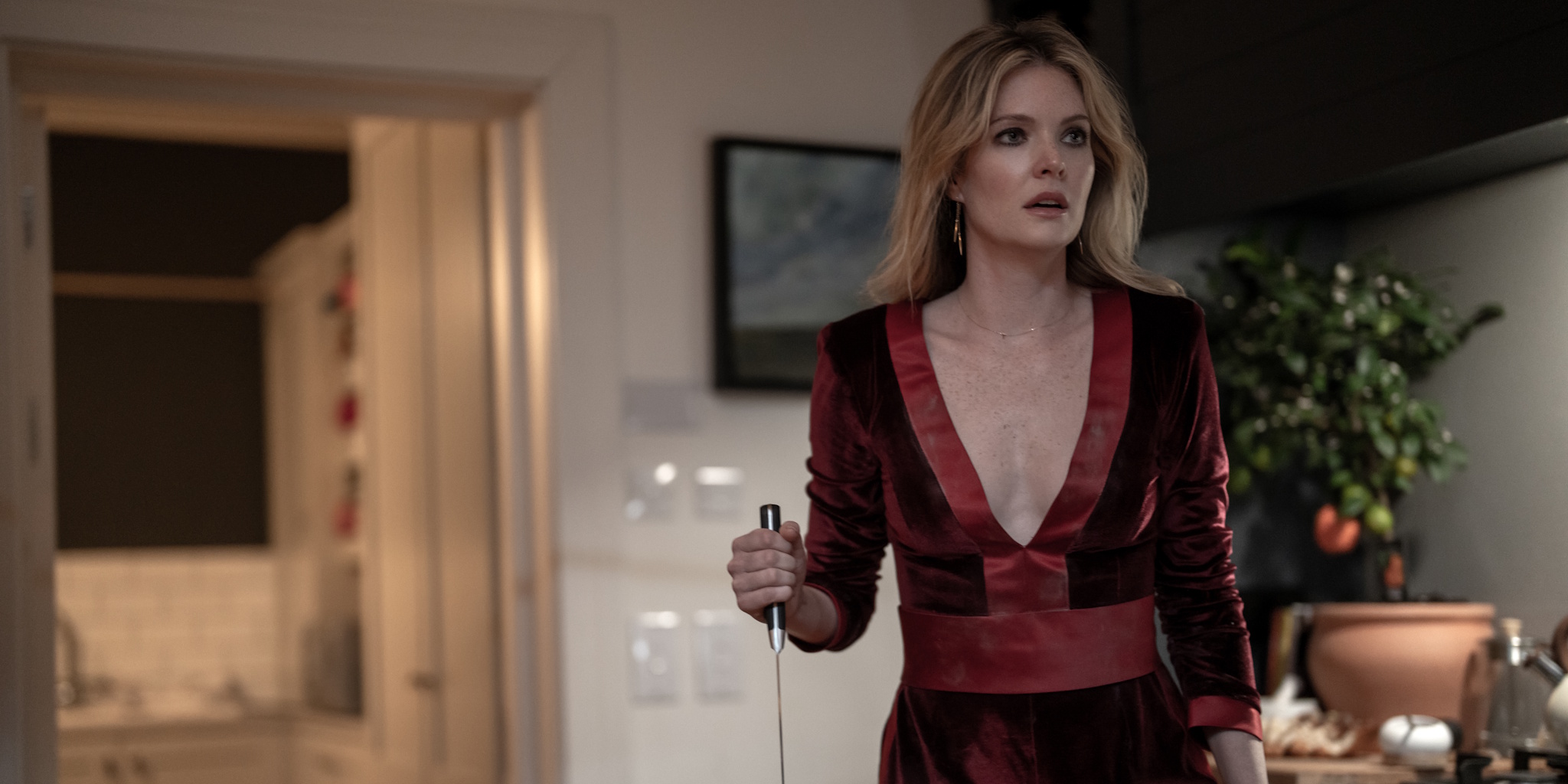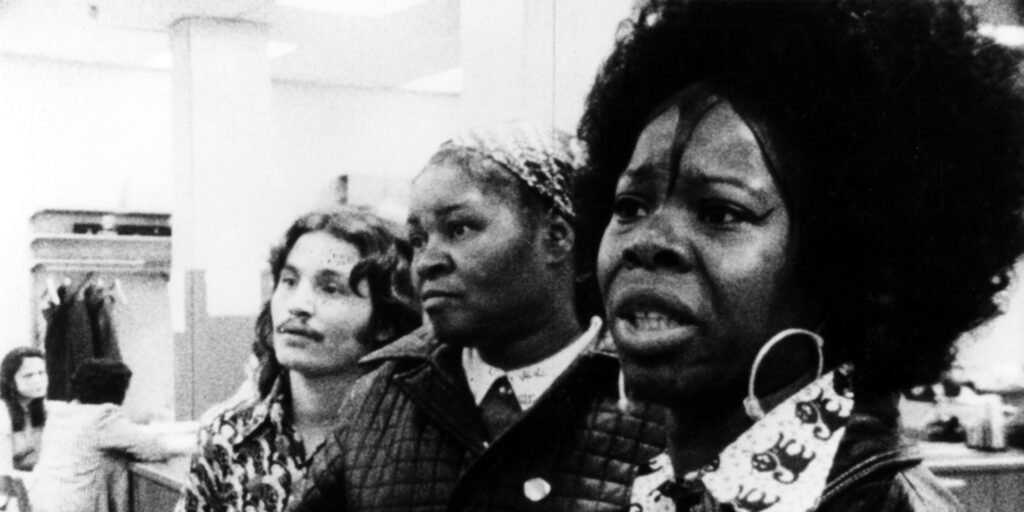A pleasantly preposterous dollop of pulpy thrills, Drop is the sort of artistically trifling but calorically dense two-bite snack that seems designed for a quick, low-effort date night. Although premised on a relatable modern aggravation – strangers “cyberflashing” messages, photos, and other unsolicited rubbish to one’s smartphone via services like AirDrop and Quick Share – Drop quickly escalates into a hybrid locked-room mystery, hostage situation, and intricate feat of criminal coercion. Ever self-aware, director Christopher Landon gives viewers permission to roll their eyes a little at all the absurd high-tech terrorism that writers Jillian Jacobs and Chris Roach inflict on their heroine. The director’s slightly campy approach signals that viewers should grant this 100-minute, PG-13 Blumhouse thriller all the seriousness it deserves (i.e., very little), while still allowing for the visceral pleasures of puzzling one’s way through a seemingly insoluble “What Would You Do?” hypothetical.
Widow and single mother Violet (The Bold Type star Meghann Fahy) hasn’t been on a date in more than a decade, which is understandable, given that her late husband was evidently a violent sociopath. For years now, she has back-burnered romance to focus on her career as a counselor to other domestic-abuse survivors and to raise her adorable moppet of a son, Toby (Jacob Robinson). Having recently resettled in Chicago, however, she reluctantly takes a chance with Henry (Brnadon Skelnar), a handsome photographer with a couple of bad-boy tattoos and no obvious faults. (Or at least none that can be discerned through the gauzy lens of a dating app.) With some urging from her younger sister, Jen (Violett Beane), Violet dons a sultry red dress and a brave face for her meetup with Henry at a posh high-rise restaurant. It’s one date: What could go wrong?
Violet’s night takes a strange turn before Henry even arrives, as an anonymous party begins dropping cryptic yet ominous memes to her phone. Given the short range of such peer-to-peer wireless services, the perpetrator must be someone in the restaurant’s dining area. Henry eventually appears, and by the time the pair are fumbling their way through the wine list and some awkward-cute small talk, the memes have escalated to text messages, which nudge Violet to check the security-camera feed at her house. Her phone’s camera app reveals a gun-wielding intruder who – as Violet watches in horror – attacks her sister and locks her son in his bedroom. The message sender then orders Violet to stay put, keep quiet, and follow their instructions to the letter, lest any permanent harm come to her loved ones.
This kicks off an agonizing ordeal in which Violet attempts to fulfill the commands of this sadistic and noticeably impatient puppet master, while simultaneously searching for a way out of her ridiculous yet perilous situation. This proves to be an unexpectedly tricky challenge, as her mysterious tormentor has not only cloned her phone but is seemingly able to see and hear every move she makes, even in the women’s restroom. Henry is astute enough to discern that something more serious than first-date jitters or single-mom anxiety is distracting Violet, whose behavior grows increasingly erratic in his eyes. Her paranoid gaze flits continuously among the restaurant’s patrons and employees, each of which is naturally holding a smartphone that they seemingly can’t put down. Which means that anyone – the hostess, the bartender, the piano player, even the gaggle of prom-bound high-schoolers at the table across the room – could be in on the scheme.
Writers Roach and Jacobs don’t have the best track record with Blumhouse, having penned both Truth or Dare (2018) and Fantasy Island (2020), two of the production house’s more misbegotten theatrical features from recent years. Fortunately, the ruthless simplicity of Drop’s (mostly) single-location concept – as well as a crisp narrative focus on their beleaguered heroine – seems to have sharpened the screenwriters’ efforts. Still, it’s tempting to attribute Drop’s modest success as a twisty thriller to director Landon, who bestows the material with both a kitschy gloss and a few showy auteurist flourishes.
Landon established his horror journeyman bona fides in the Paranormal Activity franchise, but he truly came into his own with the delightful, genre-bending slasher comedies Happy Death Day (2017) and Freaky (2020) (as well as the former’s underrated 2019 sequel). Drop isn’t remotely on the same level as those features: The telltale whiff of a work-for-hire clings to the film, which wouldn’t seem out of place had it been unceremoniously dumped on a streaming service – one of the better ones, but still. There’s a sanded-down, four-quadrant blandness to the overall presentation that’s dispiriting, evident in both its lifestyle-porny production design and the network-sitcom thinness of its secondary and tertiary characters. (The latter is exemplified by Jeffery Self’s flamboyant waiter, who is both an exhausting stereotype and a cringy delight every time he appears.)
Yet Landon has an irrepressible instinct for droll comic timing – editor Ben Beudhuin, a regular collaborator, does typically solid work here – and arresting visual and aural touches. Drop’s heightened yet relatively grounded setting doesn’t allow for anything as tremendous as, say, Jessica Rothe cheerfully skydiving to her death sans parachute (with splattery results). Yet Landon still flexes his directorial chops here and there, most notably through some nightmarish lighting and camera effects that emphasize Violet’s isolation and despair. Like Wes Craven’s great Red Eye (2005), the film works best when it emphasizes the ingenuity activated by its underestimated heroine’s desperation.
Viewers who need a mystery-thriller to hew to some measure of believability may find that Drop tests the limits of their indulgence. Setting aside its standard Hollywood conception of high-tech evildoers as omniscient and omnipotent wizards, the film is premised on a villainous plot that is both needlessly convoluted and shockingly banal in its ultimate aims. (Somewhat surprisingly, the film emerges not as a cousin to Unfriended or Searching but as a bargain-bin riff on Alan J. Pakula.) Aside from the laughable implication that downtown Chicago is a three-minute drive from the suburbs, Drop’s worst sin is its Scream VI-style penchant for sparing characters who should be dead several times over from obviously lethal injuries. One can easily envision a different, R-rated feature in which Violet’s plight is much nastier and the collateral damage more catastrophic. However, although it might be a missed opportunity for a compellingly brutal genre outing, Drop is still an entertaining diversion, one that resists the urge to tarry after the plates are cleared and the check has arrived.
Drop opens in theaters everywhere on Friday, Apr. 11.




